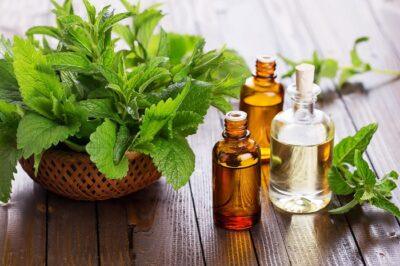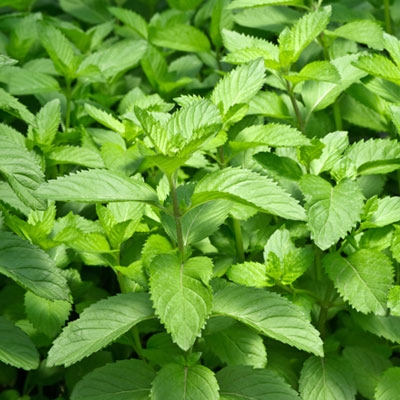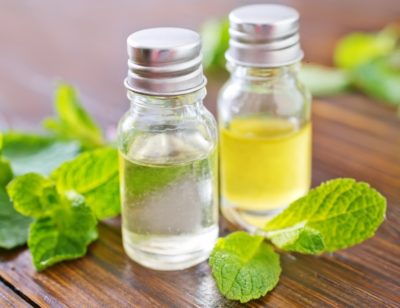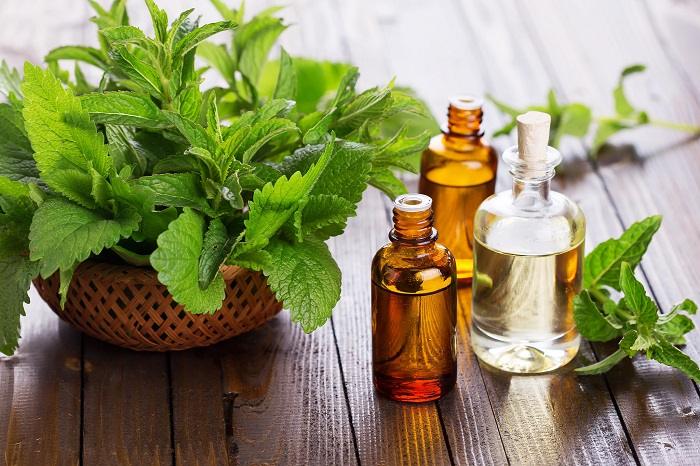
The aroma and flavor of peppermint is familiar to us because of its common use in breath fresheners. Extracted from Mentha piperita, a natural hybrid of spearmint and water mint, peppermint essential oil has been in use in Europe for ages as a digestive aid and pain reliever. It has its place in traditional Chinese medicine, too. Extremely versatile, peppermint essential oil is a safe, edible, essential oil that every household should stock.
Peppermint essential oil has a highly refreshing effect on our olfactory sense and an unmistakable cooling sensation when applied to the skin. Let’s look at the myriad ways in which it can be used.
1. To relieve muscle pain
Peppermint essential oil can be used topically, preferably mixed with carrier oils such as jojoba oil, for spot relief from sore and aching muscles. It acts by relaxing the muscles, as well as numbing the pain sensation. Pain in the lower back, post-exercise soreness in the limbs and tension headaches can be effectively treated with topical application. Using the oil in a diffuser also can help relieve headaches.
People suffering from fibromyalgia report significant relief when peppermint oil is applied on the “tender points,” and those having the chronic condition called myofascial pain syndrome find a reduction in referred pain when their “trigger points” are treated.
Could This All-Natural ‘Detox’ Capsule Have Extended John Wayne’s Life?
2. For dental hygiene and oral health
Peppermint oil is a common ingredient in toothpastes and mouthwashes, not just because of its breath freshening effect. The antibacterial property of this essential oil has been found to be on par with, or even better than, the chemical chlorhexidine used in mouthwashes to reduce tooth decay. A warm water gargle with a few drops of peppermint oil after every meal should ensure not only fresh smelling breath but prolonged protection against plaque formation and cavities.
3. In weight management
 The essential oil of peppermint is also believed to be a surprising yet effective tool for controlling weight. Brushing after every meal with mint-flavored toothpaste has been found to be an effective deterrent to snacking between meals – an effect attributed to the freshness derived from the mint flavor in the toothpaste.
The essential oil of peppermint is also believed to be a surprising yet effective tool for controlling weight. Brushing after every meal with mint-flavored toothpaste has been found to be an effective deterrent to snacking between meals – an effect attributed to the freshness derived from the mint flavor in the toothpaste.
Peppermint essential oil potentially acts by reducing appetite in other ways, too. Sipping peppermint tea or plain water with a few drops of peppermint oil in it throughout the day can help dieters who aim to reduce their food intake for weight management. Whenever you find hunger pangs threatening to derail your diet plans, sniffing this oil can help relieve them. Using it in a diffuser at mealtimes or dabbing a few drops on your wrists as you sit down for meals can help with portion control as it will make you feel satiated much faster.
4. To relieve symptoms of cold, flu and respiratory allergies
Peppermint essential oil, lavender oil and lemon oil are the trio recommended for protection against seasonal allergies. It reduces the body’s reaction to pollens and other airborne allergens. Peppermint opens up blocked nasal passages and constricted airways by relaxing the muscles, making it very effective against sinus congestion and asthma. Use peppermint oil in an inhaler and apply a few drops mixed with coconut oil on the forehead to relieve headaches from sinus congestion.
When suffering from cold or flu, use a few drops of peppermint oil in the diffuser or mix it with coconut oil to make a chest rub. In case of a fever, rub a few drops on the feet to bring down the temperature. Severe bronchitis can be relieved by taking a few drops mixed with honey, as peppermint oil can act as an expectorant to help bring up the phlegm.
5. As a natural insect repellant
Peppermint oil is a safer way to keep pesky insects at bay. Bugs often depend on their olfactory sense to zero in on their victims. Many pungent-smelling natural oils help keep them away partly because their scent detectors get confused by the strong volatile oils. Using peppermint oil in a diffuser is a pleasant way to keep insects like mosquitoes and flies away from your home. Leave some cotton balls dipped in peppermint oil in kitchen cabinets for a non-toxic way to ward off ants and cockroaches.
The Hidden Secrets Of Making Herbal Medicines…Right At Your Fingertips!
When applied on the body diluted with carrier oils, it can offer protection from blood-sucking insects for up to two hours. You also can use it with water in a spray bottle for a quick treatment as you step out of the house. External parasites such as body and hair lice and ticks on pets can be controlled with regular use.
6. To improve mental acuity and concentration
 Peppermint oil can refresh your mind and energize you when fatigue and boredom reduces your work performance. It helps the mind focus on tasks at hand, keeps you alert during long drives, and helps students concentrate on their study materials. It may even help kids with attention-deficit hyperactivity. Dab it under their collar, or use it with water in a spray bottle for an instant shot of freshness.
Peppermint oil can refresh your mind and energize you when fatigue and boredom reduces your work performance. It helps the mind focus on tasks at hand, keeps you alert during long drives, and helps students concentrate on their study materials. It may even help kids with attention-deficit hyperactivity. Dab it under their collar, or use it with water in a spray bottle for an instant shot of freshness.
7. For skin care
Skin allergies, itching and rashes get relief with the external application of a combination of peppermint oil and lavender oil diluted with almond or coconut oil. It can be safely used on skin damaged by sunburn, psoriasis and eczema. Spot treatment for acne is also effective. When used on the face, special care should be taken to avoid getting the oil in the eyes.
8. For babies and young children
Several common problems in infants can be safely treated with peppermint essential oil. For colic in infants, use it diluted with coconut oil for external application on the stomach. You also can add three drops of oil to plain water and give a few teaspoonfuls at a time to relieve the painful spasms. Teething troubles can be lessened by rubbing the gums with a mixture of peppermint oil and coconut oil in equal quantities.
Peppermint oil also has been found to be effective in reducing post-operative nausea and vomiting. People undergoing chemotherapy and radiation also may experience a similar beneficial effect. The anti-androgenic property of this potent oil is being assessed for its effectiveness in combating prostate cancer and correcting hormonal imbalance in women suffering from polycystic ovary disease.
As with any therapy, be sure to seek the advice of a medical professional before beginning treatment.
Do you know of other uses for peppermint oil? Share your suggestions in the section below:
Harness The Power Of Nature’s Most Remarkable Healer: Vinegar. Read More Here.









